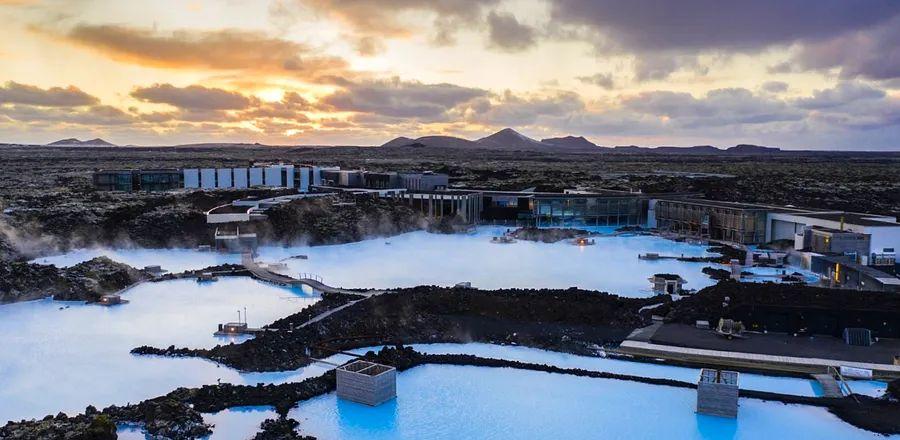Blue Lagoon in Iceland Temporarily Closes Until November Due to Volcanic Eruption Fears

Following over 20,000 earthquakes on the Reykjanes Peninsula since late October, the renowned geothermal spa Blue Lagoon has shut its doors until at least November 30.
A statement on the Blue Lagoon website noted, “The likelihood of a volcanic eruption on the Reykjanes Peninsula has greatly increased, prompting the precautionary evacuation of the town of Grindavík to protect residents.” Initially, the spa announced its closure on November 9, expecting to reopen on November 16.
Volcanic activity in Iceland commenced on October 24, marked by a “seismic swarm” of over 4,000 earthquakes in just a few days, as reported by the Icelandic Meteorological Office. This activity, concentrated around the town of Grindavík, is linked to magma accumulating several miles beneath the Earth’s surface, located about 30 miles southwest of Reykjavík and south of the Blue Lagoon.
In the weeks following the initial seismic swarm, the region has experienced thousands of additional earthquakes, illustrating the ongoing seismic activity expected during magma accumulation, according to the Icelandic Meteorological Office.
Due to the heightened risk of a volcanic eruption, the U.S. Embassy in Reykjavík has issued a volcano alert.
The embassy stated on November 13, “The Icelandic Meteorological Office has warned of a significant chance of a volcanic eruption occurring in the coming days in or near Grindavík, located 26 miles southwest of Reykjavík on the Reykjanes Peninsula.”
On Monday, the National Police Commissioner of Iceland elevated the threat level from “alert” to “emergency,” marking the highest level of concern due to the ongoing seismic activity.
Implications of a Volcanic Eruption in Iceland for Air Travel
According to the U.S. Embassy in Reykjavík's statement on November 13, “There are currently no effects on flight operations at Keflavík Airport (KEF).”
The Aviation Color Code in Iceland has been raised to orange, indicating “heightened unrest with an increased likelihood of eruption,” according to the Icelandic Meteorological Office.
Jonathan Porter, chief meteorologist for AccuWeather, stated that the 2010 eruption of Eyjafjallajökull in Iceland “created weeks of travel disruption as the volcano emitted a massive plume of volcanic ash into the atmosphere.”
Fortunately, Porter noted that the anticipated impact on air travel this time is not expected to be as severe.
However, Porter advised, “Travelers heading to and from Europe in the coming weeks, especially around the United States Thanksgiving holiday, should keep a close eye on developments in Iceland.”
He further explained, “While it seems this volcano won't significantly affect air travel across Europe like in 2010, any volcanic ash released could lead to airspace closures, so travelers should remain vigilant for possible flight cancellations and delays.”
Closure of the Blue Lagoon
The closure of the Blue Lagoon affects not only the lagoon itself but also the company’s Retreat hotel and spa, Silica hotel, and two on-site restaurants, Moss and Lava. While there is no indication of how long the closure might last, the Blue Lagoon is actively monitoring the situation, as mentioned in their statement.
The Blue Lagoon website noted, “At this moment, it is impossible to predict when or where an eruption may occur.” Currently, no other sites in Iceland outside the Reykjanes Peninsula are closed.
The Blue Lagoon stated, “These precautionary measures were implemented to ensure the safety and well-being of our guests and staff, considering the disruptions to our guests’ experience and the ongoing pressure on our employees.”
Iceland, known as the land of fire and ice, is one of the most volcanically active regions on Earth due to its location atop the Mid-Atlantic Ridge, which separates the North American and Eurasian tectonic plates. The country boasts around 130 volcanoes, with the latest eruption occurring in July at the Fagradalsfjall volcano in an uninhabited area of the Reykjanes Peninsula. This marked the third consecutive year of activity for the volcano, which also erupted in August 2022 and from March to December 2021.
Before the 2021 eruptions, this volcanic system had been dormant since the 12th century. Fortunately, none of these eruptions affected Keflavík, Iceland's largest airport, situated about 15 miles from the Blue Lagoon and roughly an hour’s drive from Reykjavík. The last temporary closure of the airport due to volcanic activity occurred in 2011 when the Grimsvotn volcano erupted, releasing a plume of smoke and ash 12 miles into the atmosphere, which disrupted transatlantic flights and grounded planes in various European locations, including Scotland and Germany.
The Blue Lagoon stands as one of Iceland's premier tourist destinations, attracting hundreds of thousands of visitors annually to a nation with a population of less than 400,000. Its striking turquoise waters, framed by black lava formations, are just one of many geothermal pools and natural hot springs that contribute to Iceland’s year-round outdoor bathing culture.
This article was initially published on November 10, 2023, and updated on November 14, 2023, to reflect the latest information.

1

2

3

4

5
Evaluation :
5/5